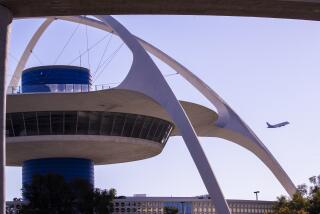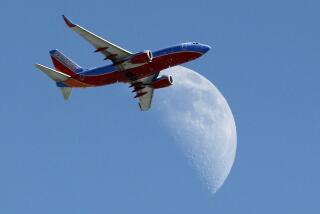Box Cutters and Notes Found on Two Jets
- Share via
WASHINGTON — The government Friday ordered airlines to search some 7,000 passenger aircraft for weapons after box cutters and notes calling airport security into question were discovered in two plastic bags hidden on separate Southwest Airlines jets.
A North Carolina college student, 20, was detained and questioned Friday, the FBI said in a statement, adding that it expected formal legal proceedings to take place Monday in U.S. District Court in Baltimore.
“Based on the investigation conducted thus far, this individual does not appear to pose any further threat to airline security,” the statement said.
FBI Director Robert S. Mueller III played down the possibility of a link to terrorism, but other officials said the incident was a worrisome reminder of continuing gaps in aviation security.
“It doesn’t appear to be a terrorist event,” Mueller said in Houston, on a scheduled visit to a local FBI office. “I think it is safe to fly.”
The chairman of the House aviation subcommittee called the discovery a warning. Box cutters were the weapons used by some of the 19 hijackers in the Sept. 11, 2001, attacks.
“It does show the vulnerability of the system,” said Rep. John L. Mica (R-Fla.). “This is a criminal act, even if the person behind it might be some well-intended vigilante trying to show the defects of the system.”
Officials said the items could have been planted by a security whistle-blower, an aviation industry employee with access to planes, or perhaps even a disgruntled frequent flier contemptuous of airport security.
Major airlines said they would search their fleets immediately, and the carriers did not anticipate any major disruptions to their schedules.
The Transportation Security Administration gave the industry 24 hours to inspect planes. An official said it was the first time the agency had issued such a sweeping order.
“The Department of Homeland Security and TSA are working very closely with the FBI to discover the origin of these items and locate the individuals responsible,” said TSA spokesman Mark Hatfield. “We are taking this extremely seriously.”
Although airport security is generally considered to have improved since the $5-billion-a-year TSA took over and deployed more than 48,000 federal screeners, it is far from airtight.
The Los Angeles Times reported in May that security agents posing undercover as passengers continued to regularly sneak mock bombs and weapons past airport checkpoints. TSA screeners complained about a lack of on-the-job training, particularly on how to spot sophisticated explosives.
Southwest Airlines spokeswoman Beth Harbin said the carrier found no other hidden weapons in its fleet of 385 jets. As of Friday evening, there were no reports of other airlines finding similar items.
Southwest said in a statement that the two suspicious bags, which were found late Thursday, appeared as if they were “intended to simulate a threat.”
The first plastic bag was discovered in New Orleans, after the flight crew reported a problem with one of the lavatories. Workers sent to fix it found the bag in the frame of the lavatory. “It was not in plain sight,” Harbin said. The plane had arrived from Orlando and was on its way to San Diego.
An administration official said the bags contained a handful of box cutters, matches, a clay-like substance apparently meant to resemble explosives and small bottles filled with a clear liquid that appeared to be bleach.
Box cutters and liquid bleach are prohibited items on airliners; clay is not. Some types of matches are forbidden. It is illegal to take any prohibited item past an airport checkpoint. Prosecutors can seek a range of civil and criminal penalties, depending on the case.
The second bag, also hidden in a lavatory, was found on a jet undergoing a scheduled maintenance check in Houston after arriving from Austin.
Each bag also contained a note. The short messages were typewritten, using the singular pronoun as opposed to the plural, one senior federal law enforcement official said. They were dated sometime in September -- but not on the symbolic date of Sept. 11, the official said.
Another senior official said, “Whoever wrote the notes said, ‘Overall, you guys are doing a good job on aviation security, but I was able to get these items past you,’ or words to that effect. It was merely to say, ‘I’m testing the system.’ ” The officials spoke on condition of anonymity.
The recovered items have been sent to the FBI’s Crime Lab for forensic tests, including fingerprint analysis, in an effort to determine the perpetrator’s identity. FBI-led Joint Terrorism Task Force teams in Houston and New Orleans are heading the investigation. The FBI is “moving fast on this investigation,” said a law enforcement official, adding, “we haven’t ruled anyone in or out at this point.”
The official said federal law enforcement and Homeland Security authorities were angry at the apparent hoax or security test, particularly since it caused them to devote so much time and energy to it when they were already stretched thin.
“We’ve got significant resources allocated to this,” the official said. “Would this person be in trouble? Yes.”
Airport screeners routinely confiscate stunningly large numbers of prohibited items -- more than 1.4 million this summer alone. Many are small scissors and pocketknives, but screeners also recently discovered a knife in a sealed soda can and a gun in a teddy bear carried by a child.
Many travelers have stories of innocently carrying Swiss Army Knives aboard without detection.
“If you put a knife inside a cluttered bag, it can be difficult to see with an X-ray machine,” said consultant Douglas Laird, former security director for Northwest Airlines. “The real issue is that we need to fund research and development to give screeners better technology.”
If a hijacker were to get on board with a knife these days, it might not be so easy to commandeer a plane. Reinforced cockpit doors have replaced the flimsy panels that allowed the Sept. 11 hijackers easy access. Thousands of air marshals are also flying regularly, though marshals are not on every flight.
“The public should know that we have a redundant security system, with secure cockpits, air marshals and pilots who are trained to carry guns,” Mica said.
Some experts have warned that the focus on airport checkpoints, though necessary, may lead officials to overlook other security vulnerabilities. Most cargo on passenger airliners is still not screened, for example.
One FBI field agent on the West Coast questioned whether the incidents on Southwest were a serious attempt to breach airport security, pointing out that clay is not one of the items that the security system is designed to catch.
“It sounds like someone is just trying to do their own operational security test, although not a very professional one,” the agent said.
*
Times staff writer Jennifer Oldham in Los Angeles contributed to this report.
More to Read
Sign up for Essential California
The most important California stories and recommendations in your inbox every morning.
You may occasionally receive promotional content from the Los Angeles Times.










